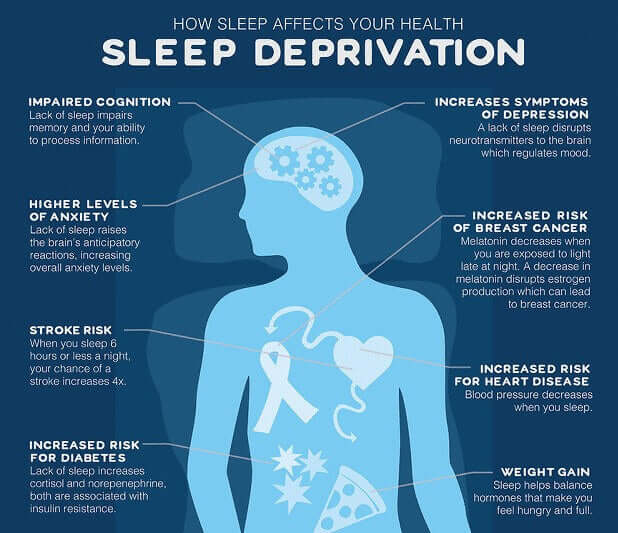Top 10 Sleeping Disorders in USA

Top 10 Sleeping Disorders in USA
- Insomnia: Difficulty falling asleep or staying asleep. It's the most common sleep disorder, affecting a significant portion of the population at some point in their lives.
- Sleep Apnea: Characterized by pauses in breathing or periods of shallow breathing during sleep. Obstructive sleep apnea, where the airway becomes blocked, is the most common type.
- Restless Legs Syndrome (RLS): A neurological disorder that causes an irresistible urge to move the legs, often accompanied by uncomfortable sensations. These symptoms typically occur in the evening or during rest.
- Narcolepsy: A chronic neurological disorder affecting the brain's ability to regulate sleep-wake cycles. It's characterized by excessive daytime sleepiness and sudden attacks of sleep.
- Parasomnias: This group includes abnormal movements, behaviors, emotions, perceptions, and dreams that occur while falling asleep, sleeping, between sleep stages, or during arousal from sleep. Common examples are sleepwalking and night terrors.
- Circadian Rhythm Sleep Disorders: These disorders involve problems with the timing of when a person sleeps and is awake. The body's internal clock is out of sync with the external environment. Examples include delayed sleep phase disorder and jet lag.
- Sleep-Related Breathing Disorders: Apart from sleep apnea, this category includes conditions like central sleep apnea and sleep-related hypoventilation.
- Hypersomnia: Excessive daytime sleepiness not caused by disturbed nocturnal sleep or misaligned circadian rhythms. People with hypersomnia feel sleepy throughout the day and may nap repeatedly.
- REM Sleep Behavior Disorder: A disorder where individuals act out vivid, often unpleasant dreams with vocal sounds and sudden, often violent arm and leg movements during REM sleep.
- Bruxism: Involuntarily grinding or clenching of the teeth while sleeping. It can lead to a variety of oral health problems and sleep disturbances.
6 Ways to Improve Your Sleep

6 Ways to Improve Your Sleep
- Consult a Doctor: If you're experiencing persistent sleep problems, it's important to consult a healthcare professional. A doctor can diagnose any underlying sleep disorders or health issues and provide appropriate treatment or recommendations.
- Invest in a New Mattress: A comfortable and supportive mattress is crucial for a good night's sleep. If your mattress is old, uncomfortable, or unsuitable for your sleeping style, consider investing in a new one that better suits your needs.
- Establish a Regular Sleep Schedule: Stick to a consistent sleep and wake schedule, even on weekends. This regularity helps regulate your body's internal clock and can improve your sleep quality over time.
- Create a Relaxing Bedtime Routine: Engage in calming activities before bed, like reading, listening to soothing music, or practicing relaxation techniques. This helps signal to your body that it's time to wind down and prepare for sleep.
- Limit Exposure to Blue Light: Reduce screen time at least an hour before bed. The blue light emitted by phones, tablets, and computers can interfere with the production of melatonin, the hormone that regulates sleep.
- Exercise Regularly: Regular physical activity can help you fall asleep faster and enjoy deeper sleep. However, try to avoid vigorous workouts close to bedtime as they might keep you awake.
The Importance of Improved Sleep

The Importance of Improved Sleep
Sleep is a fundamental aspect of human health, playing a crucial role in both physical and mental well-being. Physiologically, sleep is the time when the body undergoes repair and rejuvenation. During the deeper stages of sleep, the body releases growth hormones that aid in cell repair and muscle growth, making it essential for physical recovery. This restorative process is vital not just for physical strength and endurance, but also for maintaining a healthy immune system. Adequate sleep helps in fighting off infections, reducing inflammation, and managing stress hormones. Furthermore, sleep is integral to heart health, as it helps regulate blood pressure and cholesterol levels, both of which are key factors in preventing heart disease.
On the mental and emotional front, sleep is equally important. It plays a critical role in brain function, encompassing aspects such as cognition, concentration, productivity, and performance. During sleep, the brain processes and consolidates memories, an essential function for learning and retaining information. Lack of sleep can impair attention, alertness, reasoning, and problem-solving skills, making daily tasks more challenging. Moreover, sleep has a profound impact on mood. Insufficient sleep is linked to an increased risk of mental health issues like depression and anxiety. It affects emotional regulation and can lead to irritability and an overall decrease in emotional resilience. In essence, good sleep is not just a pillar of health; it's a foundation for a balanced and fulfilling life, enabling individuals to function at their best both physically and mentally.
At LA Mattress Store, we believe in the profound importance of a good mattress, especially considering that you spend about one-third of your life in bed. This significant amount of time directly impacts your overall health and well-being, making the quality of your mattress a crucial factor in achieving restful, rejuvenating sleep. A superior mattress offers the right balance of support and comfort, conforming to your body's unique contours and ensuring optimal spinal alignment. This not only helps in preventing aches and pains but also enhances the quality of your sleep, which is essential for physical and mental recovery. With a good mattress, you can ensure that the substantial portion of your life spent in bed contributes positively to your health, allowing you to wake up refreshed and ready to tackle the day.

